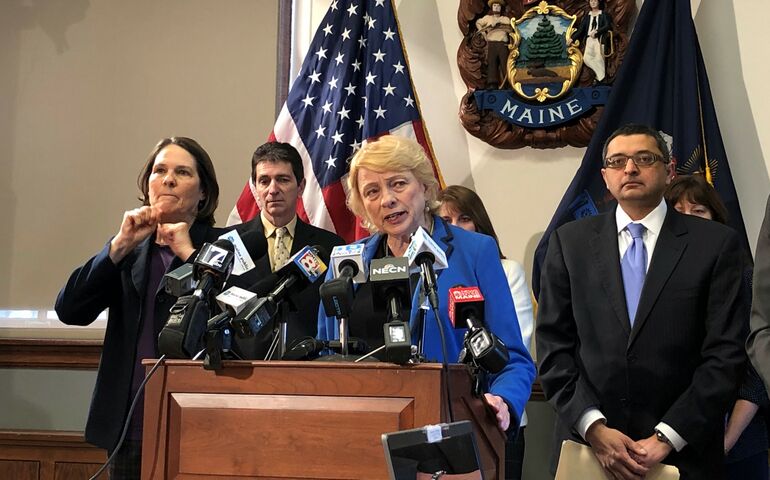Processing Your Payment
Please do not leave this page until complete. This can take a few moments.
- News
-
Editions
View Digital Editions
Biweekly Issues
- December 1, 2025
- Nov. 17, 2025
- November 03, 2025
- October 20, 2025
- October 6, 2025
- September 22, 2025
- + More
Special Editions
- Lists
- Viewpoints
-
Our Events
Event Info
Award Honorees
- Calendar
- Biz Marketplace
As more COVID-19 cases emerge, Maine grapples with response
 Photo / Maureen Milliken
Gov. Janet Mills Thursday asked Mainers to take precautions to prevent community spread of coronovirus Thursday, joined by Dr. Nirav Shah, right, director of the Maine CDC.
Photo / Maureen Milliken
Gov. Janet Mills Thursday asked Mainers to take precautions to prevent community spread of coronovirus Thursday, joined by Dr. Nirav Shah, right, director of the Maine CDC.
More Information
Maine has at least two more presumptive cases of COVID-19, the Maine Center for Disease Control and Prevention announced this morning.
The CDC was informed by MaineHealth that preliminary testing in its lab indicates two more individuals in Maine have tested presumptively positive for the disease caused by the virus. The test samples have been sent to the Maine CDC for review and will require confirmation by the U.S. Centers for Disease Control and Prevention, the CDC announced in a news release.
Maine recorded its first presumptive positive test for COVID-19 Thursday, a woman in her 50s who lives in Androscoggin County and is quarantined in her home.
The two new preliminary presumptive positive tests are for a woman in her 20s, who is in the ICU at Maine Medical Center in Portland, and a man in his 50s, who was screened at a MaineHealth outpatient clinic and is in self-isolation at home, according to the CDC and MaineHealth. No county of residence for either was immediately released.
In adherence with CDC guidelines, the patient at Maine Medical Center is in isolation and care team members are taking appropriate steps to ensure the health and safety of themselves and those around them, MaineHealth said.
As with the case announced Thursday, Maine CDC staff is investigating the patients’ travel histories under the assumption that the preliminary test results are presumptive positive. The CDC is working with MaineHealth on the two recent cases and with Central Maine Healthcare system on the first, who came through the emergency room at Center Maine Medical Center in Lewiston.
The immediate concern is for the care and treatment of the individuals who have presumptively tested positive, both the CDC and MaineHealth releases said.
Maine CDC Director Dr. Nirav D. Shah was expected to provide more information at a 1 p.m. news briefing at the Department of Health and Human Services in Augusta.
The news comes as businesses, municipalities and organizations across Maine have canceled or postponed events. Gov. Janet Mills and Shah Thursday urged that any nonessential gatherings of more than 250 not take place, and that individuals practice "social distancing."
Shah said there's a science behind the large-scale indoor gatherings suggestion. Social distancing, not only for large indoor gatherings, but in general, will help interrupt the flow of the virus and "flatten the curve," reducing the number of cases and spreading them over a longer period of time.
One of the reason the virus is being taken so seriously, he said, is that there is no immunity and no vaccine, meaning it spreads more easily among more people.
"The strongest tool we have in our kit is to prevent individuals from coming into contact," he said. The risk of contact increases as large numbers of people are crowded into indoor spaces.
New testing procedures
The two latest COVID-19 cases come after NorDx Laboratories, a MaineHealth subsidiary, began testing on Wednesday and expanding the scope and speed of testing results in Maine, according to MaineHealth.
Health officials expected that the number of presumptive positive coronavirus cases to grow with the new testing.
Because this is a new virus with new testing methods, which may run the risk of falsely positive results, MaineHealth is working closely with the Maine and federal CDC to confirm the preliminary results, the health care system said in a news release.
Maine Medical Center, as with other local MaineHealth hospital organizations, is well prepared to treat patients with coronavirus. At each facility, Hospital Incident Command Systems have been activated, and care teams that have trained and planned for this possibility are staying up to date with the latest guidance from the CDC.
“While it is understandably unsettling to members of the community that this outbreak has come to Maine, we are prepared for this across our system,” said Dora Mills, MaineHealth’s chief health improvement officer.
Most cases of COVID-19 infection bring flu-like symptoms that are mild to moderate and can be treated at home, she said, stressing that patients should only be treated at a hospital in the small minority of cases where symptoms are severe.
“We should take the threat of COVID-19 seriously, but there is no need to panic," she said. "As with seasonal flu, there are common-sense steps each of us can take to slow the spread of infection and reduce our chances of getting sick."
Collins meets with health officials
U.S. Sen. Susan Collins was in Augusta this morning to meet with leaders of Maine’s health care providers on Maine's front lines of the coronavirus crisis.
Collins met with members of the Maine Hospital Association and the Maine Medical Association at her constituent service center on Sewall Street. The health officials shared insights and discussed what resources they need to properly protect Mainers and help slow the spread of COVID-19.
The U.S. Senate has canceled the state work period that was originally scheduled for next week, following Collins’ call for the chamber to remain in session and consider legislation to combat the coronavirus. Collins, a senior member the Appropriations Committee and a member of the Senate Health Committee, voted to advance a $7.8 billion package to fight the coronavirus, which was signed into law on March 6. The Maine CDC will get $4.6 million through the funding.
Legislature proceeds with caution
A few blocks away from Collins' meeting, the Maine State Legislature, which is in session until April 15, continued to work on state emergency budget measures. It's up to House and Senate leaders to determine how to proceed and whether the session would be ended.
All public events at the Hall of Flags in the State House have been canceled for the remainder of the session, and the public galleries in the chambers have been closed to the public.
Senate President Troy Jackson, D-Allagash, and House Speaker Sarah Gideon, D-Freeport, said lawmakers are monitoring the situation closely, both in light of protecting Mainers' health, as well as continuing to meet.
"For now, the Legislature will continue its work," Jackson said in a joint news release. "The seats in the Senate Chamber remain open to the public. Members of the press will still be able to be in the chamber and cover the Senate. Presiding officers will continue to reassess in consultation with the Maine Center for Disease Control and Maine Emergency Management Association on a daily basis."
Gideon said, “As COVID-19 continues to spread through the United States and the latest case here in Maine, we are monitoring the situation closely, following the guidance of the Maine Centers for Disease Control and Maine Emergency Management Agency, and taking necessary precautions to protect the health and safety of legislators, staff and members of the public.
The state's Maine Statehood Day ceremony at the Augusta Armory, scheduled for Sunday, has been postponed.
Mills, Shah urge precautions
On Thursday, Mills and Shah at a news conference urged Mainers to take precautions, just minutes after the state's first coronavirus case was confirmed.
“The Maine CDC has been preparing for this eventuality since the end of last year,” said Mills. “Maine has a unique window of opportunity to delay an outbreak, like those we see in other states, and to minimize our exposure.”
Mills announced several steps the state is taking to prevent community spread of the disease:
- She proclaimed an insurance emergency to improve access to care and require private health insurance plans to cover costs related to coronavirus testing;
- Suspended all non-essential out-of-state work travel by state employees;
- Recommended, on the advice of Maine CDC, that non-essential indoor gatherings of 250 attendees or more be postponed.
It's an approach "based on science and fact, not fear," Mills said. The measures will be reevaluated in two weeks.
She also said that while nursing homes and other senior care centers are most at risk of the virus, which affects the elderly and those will health issues the most seriously, people must find ways to make sure to stay in contact with their loved ones in those places.
"Social isolation is a concern at a time like this," she said.
Preparation, steps
Last week, Mills convened a Coronavirus Response Team, led by Shah, to coordinate state government’s response across departments and local agencies and health authorities to the threat of COVID-19. The response team builds on the work that has already been done by the Maine CDC to prepare for potential cases of COVID-19.
The insurance emergency is supported by state law — Mills has the authority to proclaim an insurance emergency in order to respond to “an existing or imminent likelihood of need for a significant increase in health care services or insurance benefit payments due to injuries or sickness.”
The proclamation, which Mills signed Thursday, allows the superintendent of the Maine Bureau of Insurance to require health insurance carriers providing health care coverage in Maine’s commercial market to cover costs related to coronavirus testing and increases access to care.
While it only affects private insurance sold in the commercial market, the Department of Health and Human Services is also issuing emergency rules to ensure MaineCare provides comprehensive coverage for lab testing and medical treatment.
The state nonessential employee travel suspension will be left to the discretion of department commissioners, and the need for the directive will be evaluated within the next 30 days, she said.
COVID-19 FAQs
What can individuals do to protect their health?
To help slow the spread of infection, the CDC recommends individuals practice good hand hygiene, stay home when they’re sick and cover coughs and sneezes with a tissue and discard it.
"The best thing that Maine people can do to protect their health is to take the same preventive measures that avoid catching a cold," Gov. Janet Mills said Thursday. "Wash your hands often for 20 seconds. Cover coughs and sneezes. Stay home if you are sick."
What are the symptoms?
Symptoms of COVID-19 include fever, shortness of breath, and lower respiratory distress.
What should those who have symptoms do?
Those with such symptoms should call ahead to a health care professional, state health officials said. Health care providers will make the initial determination on whether COVID-19 testing is advisable. In cases where it is, medical providers will alert the Maine CDC to coordinate testing. As appropriate, health providers will take samples and submit them to the CDC.
Should people be worried about their pets?
IDEXX Laboratories, a Westbrook-based global leader in veterinary diagnostics and software, said it has seen no positive results in pets of the strain. IDEXX evaluated thousands of cat and dog specimens during validation of a new veterinary test system for the COVID-19 virus, according to a news release from the company.
The test results align with the current expert understanding that COVID-19 is primarily transmitted person-to-person and supports the recommendation against testing pets for the COVID-19 virus. For dogs or cats presenting with respiratory symptoms, the recommendation is to contact a veterinarian to test for more common respiratory pathogens.
“Should leading health authorities determine it is clinically relevant to test pets for the COVID-19 virus, IDEXX will be ready to make the IDEXX SARS-CoV-2 (COVID-19) RealPCR Test available,” said Jay Mazelsky, president and CEO of IDEXX Laboratories. “Pets are important members of our family, and we want to keep them healthy and safe. We will continue to monitor COVID-19 and pet health across our global IDEXX Reference Laboratories network as this situation evolves.”
Mainebiz web partners

The Giving Guide
The Giving Guide helps nonprofits have the opportunity to showcase and differentiate their organizations so that businesses better understand how they can contribute to a nonprofit’s mission and work.
Learn More
Work for ME
Work for ME is a workforce development tool to help Maine’s employers target Maine’s emerging workforce. Work for ME highlights each industry, its impact on Maine’s economy, the jobs available to entry-level workers, the training and education needed to get a career started.
Learn More
Groundbreaking Maine
Whether you’re a developer, financer, architect, or industry enthusiast, Groundbreaking Maine is crafted to be your go-to source for valuable insights in Maine’s real estate and construction community.
Learn more-
The Giving Guide
The Giving Guide helps nonprofits have the opportunity to showcase and differentiate their organizations so that businesses better understand how they can contribute to a nonprofit’s mission and work.
-
Work for ME
Work for ME is a workforce development tool to help Maine’s employers target Maine’s emerging workforce. Work for ME highlights each industry, its impact on Maine’s economy, the jobs available to entry-level workers, the training and education needed to get a career started.
-
Groundbreaking Maine
Whether you’re a developer, financer, architect, or industry enthusiast, Groundbreaking Maine is crafted to be your go-to source for valuable insights in Maine’s real estate and construction community.
ABOUT
NEW ENGLAND BUSINESS MEDIA SITES
No articles left
Get access now
In order to use this feature, we need some information from you. You can also login or register for a free account.
By clicking submit you are agreeing to our cookie usage and Privacy Policy
Already have an account? Login
Already have an account? Login
Want to create an account? Register
Get access now
In order to use this feature, we need some information from you. You can also login or register for a free account.
By clicking submit you are agreeing to our cookie usage and Privacy Policy
Already have an account? Login
Already have an account? Login
Want to create an account? Register







0 Comments